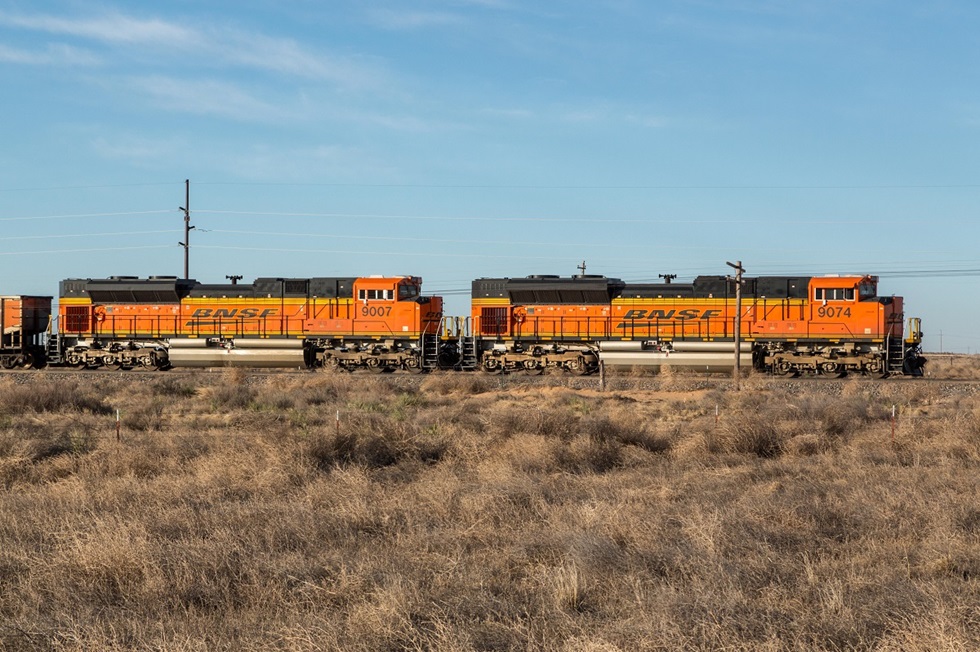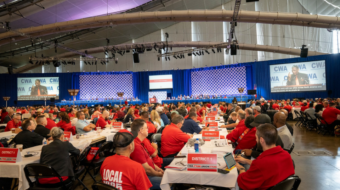
WASHINGTON —The unions won’t use those words, but they want federal regulators to almost shut down one of the nation’s big freight railroads, the Burlington Northern Santa Fe, until the feds can certify BNSF’s locomotives and freight cars are safe and meet federal standards.
Eight craft unions on the carrier and the AFL-CIO Transportation Trades Department wrote to the Federal Railroad Administration that locomotive inspections have become so rushed, and inspectors so few, on BNSF that they want the government to sidetrack hundreds of its locomotives as a safety risk.
They demand immediate inspections—by the feds, not the railroad. And they want safety audits, too.
The letter from Transportation Trades Department President Greg Regan and the Brotherhood of Railroad Carmen/IAM, the Machinists, the Electrical Workers, the Firemen and Oilers/SEIU, the Smart Transportation Division, the Transportation Communications Union, and the Transport Workers is the latest episode in rail labor’s continual campaign to get the big freight carriers to put people—and safety—over profits.
Responding to Wall Street investors, who demand dividends and stock buybacks at the price of workers’ jobs and railroad “efficiency,” the big freight carriers have cut approximately 30% of their workers starting in 2015. The slashes have been especially notable in the inspector workforce, and not just inspections of locomotives. BNSF has let 41% of its inspectors go, the letter says.
Rushed inspections of freight cars and a lack of trackside sensors to flag wheel and axle problems produced the massive derailment and crash in East Palestine, Ohio, just over a year ago. Leaking freight cars released toxic chemicals which poisoned the local river, and sent a mushroom-like cloud looming over the small town.
And some 39 members of the Brotherhood of Maintenance of the Way Employees/Teamsters, sent to clean up the mess, also sickened with nausea and migraine headaches.
Sen. Sherrod Brown, D-Ohio, backed by rail unions and other lawmakers, introduced legislation to re-regulate the railroads on safety measures, to protect workers and communities. Rail firm lobbying has sidetracked the legislation. Meanwhile, BNSF laid off more unionized rail inspectors on February 27.
Transportation Trades Department and the unions want the federal agency “to immediately conduct unannounced focused inspections of all BNSF owned and leased locomotives and rail cars located at, or in transit, to all BNSF Locomotive Maintenance Inspection Terminals and issue non-compliance orders requiring BNSF to repair any defects before being permitted to utilize their locomotives and rail cars.
“We have long-held concerns about numerous defects that are intentionally being ignored and neglected by BNSF because managers are under pressure to perform work with an inadequate number of workers,” their letter said.
Workers in those eight rail shop craft unions “were being instructed by railroad managers not to perform federally required safety inspections of locomotives and rail cars, to ignore the findings and reporting of defects, harassed to perform inspections in impossibly-short timeframes, and the workers have even been instructed to fabricate federally required inspection reports at shops across BNSF.
“BNSF carried out this scheme because of its constant push to cut costs and turn higher profits for shareholders, regardless of its impact on safety… BNSF enacted this scheme because there simply were not enough Mechanical Department workers to perform this critical work. And what better way to speed up operations than to avoid inspections, services, maintenance, and repair altogether? Like other Class I railroads, BNSF decimated their workforce.”
And on Jan. 15, 2024, the Association of American Railroads—the freight carriers’ lobby—asked FRA to waive inspection rules for “several hundred” BNSF locomotives. Otherwise, the locomotives would flunk federal rules mandating frequent inspections and needed repairs. BNSF blamed a snowstorm, a common winter occurrence, for that failure. Federal Railroad Administrator Amit Bose turned the BNSF demand down.
“BNSF’s actions represent a reckless disregard for the safety and integrity of our nation’s railways,” Regan and the unions said in a joint statement.” BNSF recently admitted in public filings they would not comply with federally mandated safety inspections, and we continue to be informed that BNSF has numerous FRA defects on their locomotives and rail cars.
“There is no shortage of profits for BNSF, and there is no shortage of work to be performed on BNSF equipment. There is simply an obscene shortage of workers and disregard for people at BNSF. By prioritizing cost-cutting over safety, BNSF is placing its employees and the public at risk.”
The railroad lobby has no direct response yet to the joint letter to FRA about the hazardous locomotives at BNSF.
Instead, it issued a report on March 5, based—it claimed—on the agency’s data, declaring accident rates, and worker fatalities, have hit either all-time lows or lows since the year 2000. The aggregate data, however, also includes short-line railroads, small railroads, and similar firms, not just the big Class I freight railroads.
BNSF’s website and the federal agency’s website had no comments about the unions’ letter.
We hope you appreciated this article. At People’s World, we believe news and information should be free and accessible to all, but we need your help. Our journalism is free of corporate influence and paywalls because we are totally reader-supported. Only you, our readers and supporters, make this possible. If you enjoy reading People’s World and the stories we bring you, please support our work by donating or becoming a monthly sustainer today. Thank you!










